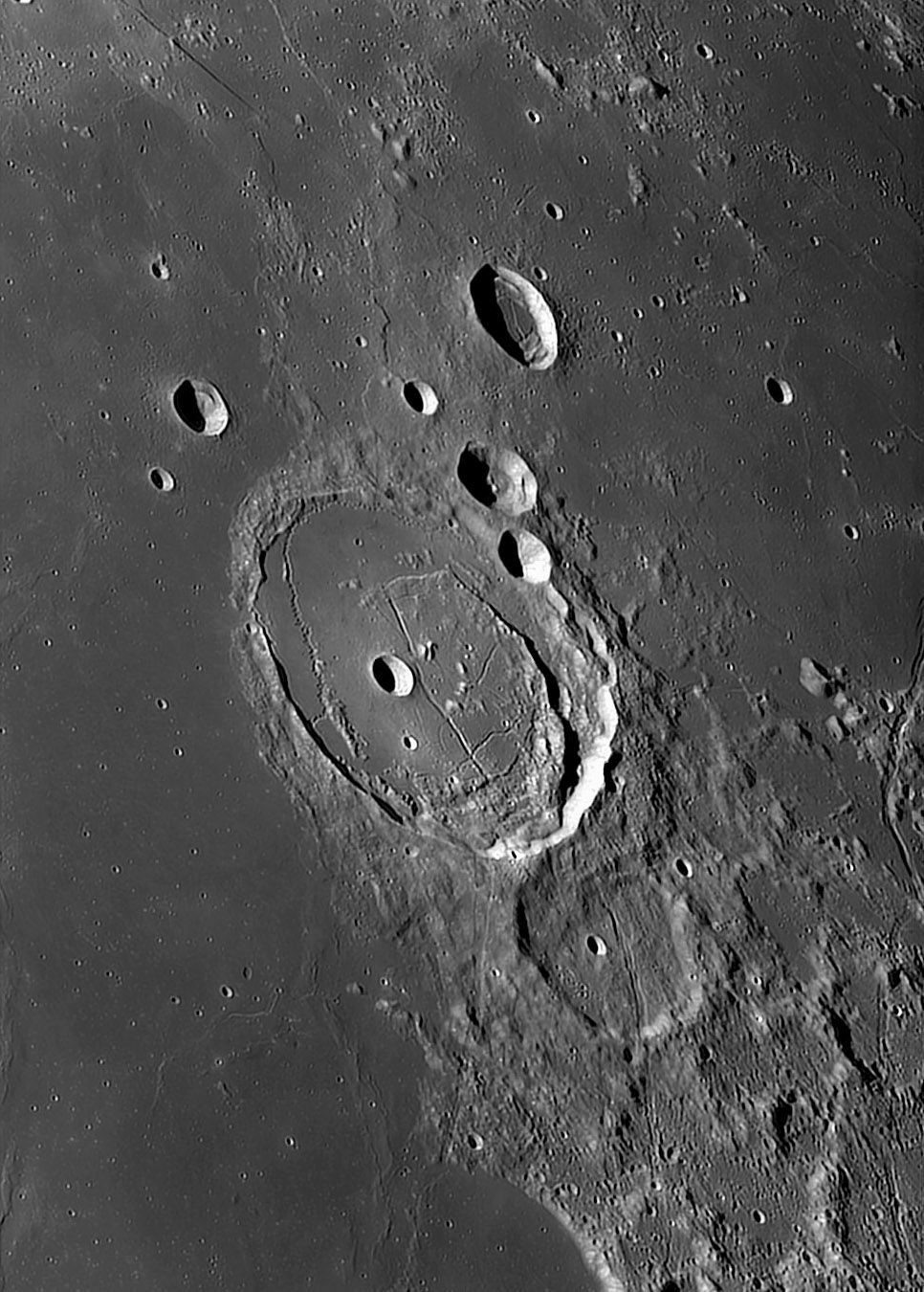Difference between revisions of "August 5, 2018"
| Line 7: | Line 7: | ||
<em>image by [mailto:CHRISTIAN.ARSIDI@wanadoo.fr Christian Arsidi], France</em><br /> | <em>image by [mailto:CHRISTIAN.ARSIDI@wanadoo.fr Christian Arsidi], France</em><br /> | ||
<br /> | <br /> | ||
| − | The May 7th [http://lpod. | + | The May 7th [http://www2.lpod.org/wiki/May_7,_2009 LPOD] featured Posidonius with lighting from the east, so it is fitting, two weeks later, to see it under a similar but opposite angle of illumination. Christian's image is similar to previous high resolution views of this area but somehow it emphasizes the rilles that seem to be everywhere. There are the angular rilles chopping through the tilted floor of Posidonius, and the zipper rille hugging the northern wall and then striking off southward through the younger lava floor. South of the crater are two linear rilles. Chacornac IV runs from the rim of LeMonnier (bottom center) up to the rim crest of Posidonius. Chacornac I passes through the center of Chacornac but disappears under rim debris from Posidonius. Although they look similar, Chacornac I must be older than Posidonius, and IV is younger - surprising. Römer II is at the bottom right, and after a gap continues northward, now with the name G. Bond I. Looking at the northern rim of Posidonius do you see a short rille-like trough that could be the extension of Chacornac IV? Notice that segments of a narrower rille prolong this trend another 60 km. East of these segments is Daniell - this is one of the few terrestrial images that reveals the rilles on its [[October_27,_2006|strange floor]]. At upper left is the straight rille Daniell I, and all the way over to the mid-right is an unlettered straight rille that parallels I, although is somewhat offset from its alignment. Why is this area so rilliferous? The rilles in the two floor-fractured craters - Posidonius and Daniell - are typical of large craters near basin edges, and the rilles south and east of Posidonius probably formed when the center of the Serenitatis basin sagged when filled with the mare lavas. The Daniell I rille is morphologically different - I don't know what it is related to - do you?<br /> |
<br /> | <br /> | ||
<em>[mailto:tychocrater@yahoo.com Chuck Wood]</em><br /> | <em>[mailto:tychocrater@yahoo.com Chuck Wood]</em><br /> | ||
Latest revision as of 07:24, 28 October 2018
Rilleorama
Originally published May 23, 2009

image by Christian Arsidi, France
The May 7th LPOD featured Posidonius with lighting from the east, so it is fitting, two weeks later, to see it under a similar but opposite angle of illumination. Christian's image is similar to previous high resolution views of this area but somehow it emphasizes the rilles that seem to be everywhere. There are the angular rilles chopping through the tilted floor of Posidonius, and the zipper rille hugging the northern wall and then striking off southward through the younger lava floor. South of the crater are two linear rilles. Chacornac IV runs from the rim of LeMonnier (bottom center) up to the rim crest of Posidonius. Chacornac I passes through the center of Chacornac but disappears under rim debris from Posidonius. Although they look similar, Chacornac I must be older than Posidonius, and IV is younger - surprising. Römer II is at the bottom right, and after a gap continues northward, now with the name G. Bond I. Looking at the northern rim of Posidonius do you see a short rille-like trough that could be the extension of Chacornac IV? Notice that segments of a narrower rille prolong this trend another 60 km. East of these segments is Daniell - this is one of the few terrestrial images that reveals the rilles on its strange floor. At upper left is the straight rille Daniell I, and all the way over to the mid-right is an unlettered straight rille that parallels I, although is somewhat offset from its alignment. Why is this area so rilliferous? The rilles in the two floor-fractured craters - Posidonius and Daniell - are typical of large craters near basin edges, and the rilles south and east of Posidonius probably formed when the center of the Serenitatis basin sagged when filled with the mare lavas. The Daniell I rille is morphologically different - I don't know what it is related to - do you?
Chuck Wood
Technical Details
October 18th, 2008, C14 + Skynyx 2-1M
Related Links
Rükl plate 14
Yesterday's LPOD: Coming In
Tomorrow's LPOD: Tiny New Rille & Broad Mare Ridge
COMMENTS?
Register, Log in, and join in the comments.



